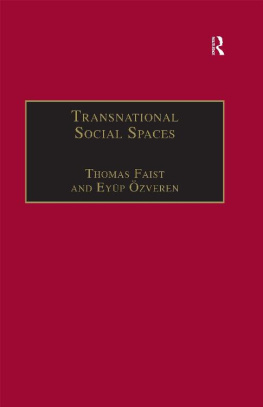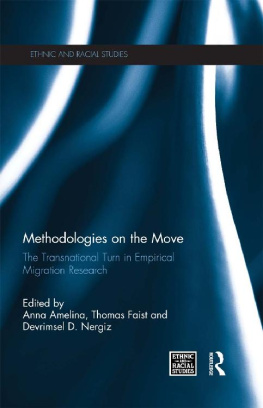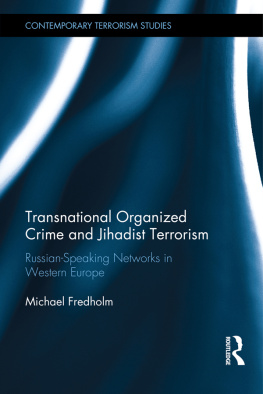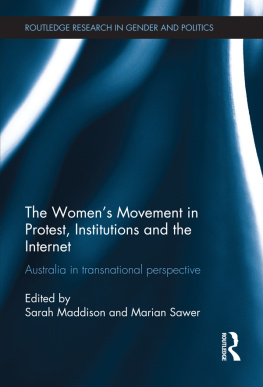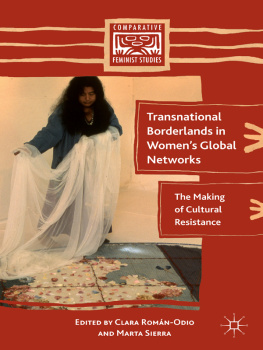Thomas Faist - Transnational Social Spaces: Agents, Networks and Institutions
Here you can read online Thomas Faist - Transnational Social Spaces: Agents, Networks and Institutions full text of the book (entire story) in english for free. Download pdf and epub, get meaning, cover and reviews about this ebook. year: 2017, publisher: Taylor and Francis, genre: Science. Description of the work, (preface) as well as reviews are available. Best literature library LitArk.com created for fans of good reading and offers a wide selection of genres:
Romance novel
Science fiction
Adventure
Detective
Science
History
Home and family
Prose
Art
Politics
Computer
Non-fiction
Religion
Business
Children
Humor
Choose a favorite category and find really read worthwhile books. Enjoy immersion in the world of imagination, feel the emotions of the characters or learn something new for yourself, make an fascinating discovery.
- Book:Transnational Social Spaces: Agents, Networks and Institutions
- Author:
- Publisher:Taylor and Francis
- Genre:
- Year:2017
- Rating:5 / 5
- Favourites:Add to favourites
- Your mark:
- 100
- 1
- 2
- 3
- 4
- 5
Transnational Social Spaces: Agents, Networks and Institutions: summary, description and annotation
We offer to read an annotation, description, summary or preface (depends on what the author of the book "Transnational Social Spaces: Agents, Networks and Institutions" wrote himself). If you haven't found the necessary information about the book — write in the comments, we will try to find it.
Thomas Faist: author's other books
Who wrote Transnational Social Spaces: Agents, Networks and Institutions? Find out the surname, the name of the author of the book and a list of all author's works by series.
Transnational Social Spaces: Agents, Networks and Institutions — read online for free the complete book (whole text) full work
Below is the text of the book, divided by pages. System saving the place of the last page read, allows you to conveniently read the book "Transnational Social Spaces: Agents, Networks and Institutions" online for free, without having to search again every time where you left off. Put a bookmark, and you can go to the page where you finished reading at any time.
Font size:
Interval:
Bookmark:
TRANSNATIONAL SOCIAL SPACES

Agents, Networks and Institutions
Edited by
THOMAS FAIST
University of Applied Sciences, Bremen, Germany
EYP ZVEREN
Middle East Technical University, Ankara, Turkey

First published 2004 by Ashgate Publishing
Published 2016 by Routledge
2 Park Square, Milton Park, Abingdon, Oxon OX14 4RN
711 Third Avenue, New York, NY 10017
Routledge is an imprint of the Taylor & Francis Group, an informa business
Copyright Thomas Faist and Eyp zveren
Thomas Faist and Eyp zveren have asserted their right under the Copyright, Designs and Patents Act, 1988, to be identified as the editors of this work.
All rights reserved. No part of this book may be reprinted or reproduced or utilised in any form or by any electronic, mechanical, or other means, now known or hereafter invented, including photocopying and recording, or in any information storage or retrieval system, without permission in writing from the publishers.
Notice:
Product or corporate names may be trademarks or registered trademarks, and are used only for identification and explanation without intent to infringe.
British Library Cataloguing in Publication Data
Transnational social spaces : agents, networks and
institutions. - (Research in migration and ethnic relations series)
1. Turks - Germany - Social conditions 2. Turks - Germany
Ethnic identity 3. Turks - Germany - Cultural assimilation
4. Transnationalism 5. Culture conflict - Germany 6. Germany
Relations - Turkey 7. Turkey - Relations - Germany 8. Germany
- Ethnic relations 9. Germany- Emigration and immigration
I. Faist, Thomas, 1959- II. zveren, Eyp
305.89435043
Library of Congress Cataloging-in-Publication Data
Transnational social spaces : agents, networks and institutions / [edited] by Thomas
Faist and Eyp zveren.
p. cm. --(Research in migration and ethnic relations series)
Includes bibliographical references and index.
1. Turks--Germany--Social conditions. 2. Germany--Ethnic relations. 3. Germany--Emigration and immigration. 4. Turkey--Emigration and immigration. 5. Group identity--Germany. 6. Immigrants--Cultural assimilation--Germany. 7. Immigrants--Cultural assimilation--Turkey. 8. Social integration--Germany. I. Faist, Thomas, 1959- II. zveren, Eyp, 1959- III. Series.
DD78.T87T73 2004
305.89'435043--dc22 2004007280
ISBN 9780754632917 (hbk)
Thomas Faist
Zeynep Kadirbeyolu
Hanife Aliefendiolu
Bianca Kaiser
Emre Arslan
Cem Dibudak
Marita Lintfert
Kira Kosnick
Gaby Straburger
Hanife Aliefendiolu has a PhD in Anthropology from Hacettepe University, Ankara. She has been involved in the activities of various civil society organizations and civil service departments concerned with women's rights. Currently she is Assistant Professor at Eastern Mediterranean University, Magusa, Turkish Republic of North Cyprus.
Emre Arslan is a doctoral Student in the Department of Sociology at Biele-feld University. He graduated from the Department of Political Science at the Middle East Technical University, Ankara, and wrote his Master Thesis on The Role of the Nationalist Action Party in Turkey in the Department of Political Science at Bilkent University, Ankara. The subject of his dissertation is the reproduction process of nationalist myths among Turkish fascists in Germany.
Cem Dibudak received his Master of Science degree in 1996 in Economics from Oklahoma State University, USA and his PhD in 2003 in Economics from Middle East Technical University, Turkey. His main areas of interest are the economics of international migration, history of economic thought, macroeconomic theory, economic development, and the Turkish economy. Currently, he is a researcher at Mula University.
Thomas Faist is Professor of Political Science and Political Management and Director of the Centre on Migration, Citizenship and Development (COMCAD) at the University of Applied Sciences Bremen. He received his PhD from The Graduate Faculty, New School for Social Research in New York. He currently directs research projects on the politics of dual citizenship, funded by the Volkswagen Foundation, and on migration control and democracy in Europe, sponsored by the German Research Foundation (Deutsche Forschungsgemeinschaft).
Zeynep Kadirbeyolu is a doctoral candidate at the Department of Political Science at McGill University. Her research interests are state-society relations with reference to development projects and participation. Among her publications are State Structures: Coercion vs. Co-ordination. Some Lessons for Turkey, co-authored with Fikret Adaman (New Perspectives on Turkey, Spring 1999) and Medieval Business Partnerships: Islamic vs. Western (New Perspectives on Turkey, Fall 2001).
Bianca Kaiser is Assistant Professor of International Relations and Director of the International Office at stanbul Kltr University. Her research interests include Germany's EU policies, Turkish-German relations, and migration from the EU to Turkey. Her latest publications include German Foreign Policy after Unification: Normality or Assertiveness? (stanbul Kltr University Journal of Social Sciences, 2002) and Almanya nzn Avrupa Politikasz: 1949-2003 (stanbul: Balam Yaynlar, forthcoming).
Kira Kosnick is research fellow at the University of Southampton, UK, where she is working for the EU Fifth Framework project Changing City Spaces that studies cultural policy and migrant cultural scenes in European capital cities. She received her Ph.D. in cultural anthropology from The Graduate Faculty, New School for Social Research in New York, with a doctoral thesis on local Turkish minority media in Berlin. Her current research interests include the transformation and reconfiguration of urban space through transnational cultural practices.
Marita Lintfert received her Master of Arts degree in German as a Foreign Language, English and American Literature and Sociology at the Bielefeld University. From 1996-2000 she was a lecturer at the Marmara University in stanbul, Turkey. She is currently teaching at the Goethe-Institute Inter Nationes and at the Foreign Language Centre of the state of Bremen.
Eytp zveren is Professor at the Faculty of Economics and Administrative Sciences, Middle East Technical University, Ankara. He studied economics and sociology. Formerly affiliated with the Fernand Braudel Center for the Study of Economies, Historical Systems and Civilizations of the State University of New York at Binghamton (USA), he has been involved in the worldsystems analysis of large-scale, long-term social change. He is the author of numerous publications with a theoretical specialization in institutionalism and a geographical focus on the Eastern Mediterranean.
Gaby Straburger received her doctoral degree in Social Sciences at the University of Osnabrck, Germany. Since 2002 she has been coordinator of Community Work at the Institut fr Stadtteilbezogene Soziale Arbeit und Beratung (ISSAB), Essen. She wrote her dissertation on Marriage Behaviour and Partner Choice in the Context of Immigration.
Next pageFont size:
Interval:
Bookmark:
Similar books «Transnational Social Spaces: Agents, Networks and Institutions»
Look at similar books to Transnational Social Spaces: Agents, Networks and Institutions. We have selected literature similar in name and meaning in the hope of providing readers with more options to find new, interesting, not yet read works.
Discussion, reviews of the book Transnational Social Spaces: Agents, Networks and Institutions and just readers' own opinions. Leave your comments, write what you think about the work, its meaning or the main characters. Specify what exactly you liked and what you didn't like, and why you think so.

